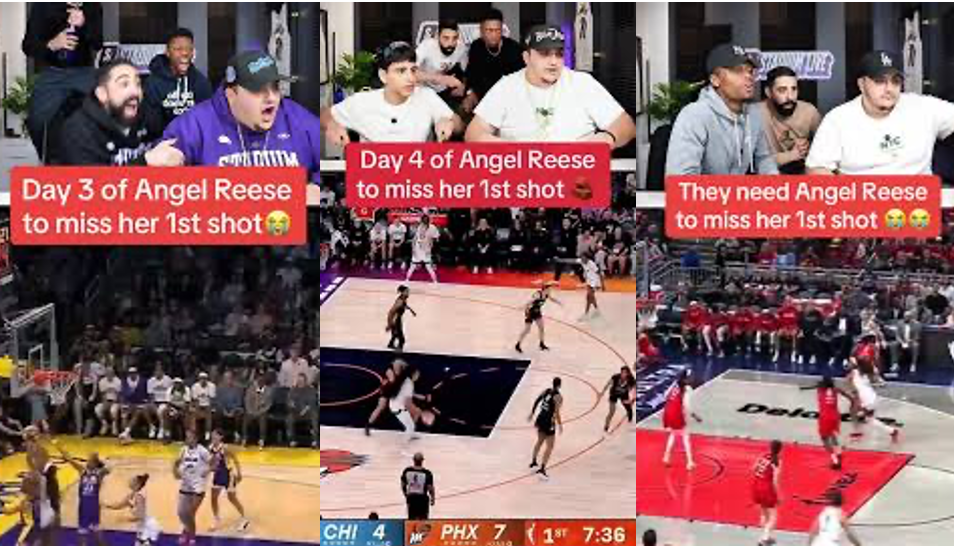Will the Visibility Gained from Toxic Bets Ultimately Benefit or Harm the WNBA?
The Angel Reese case wasn’t a sideshow. It was a stress test.
As the WNBA grows its audience and embraces new revenue models, sports betting is becoming a central part of that strategy. But last month, a viral episode raised a serious question:
What happens when visibility comes at the cost of dignity?
A TikTok trend exploded around a single proposition: Angel Reese to miss her first shot. The platform wasn’t FanDuel or DraftKings. It was Stadium Live, a gamified app that uses fake coins, not real money. But the damage wasn’t fake.
Stadium Live leaned into it. Their TikTok bio declared: Home of the Angel Reese miss.
They posted the same “bet” for over a week.
Fans gamified her failure. The content went viral.
Reese became the center of a joke she never signed up for.
Eventually, the legal threats came. The posts started to disappear. But the culture behind it didn’t…. And that’s the real issue.
This wasn’t just about one player
It was about the conditions we’re creating around women’s sports as they enter the betting economy.
It was about what happens when a player becomes a product, and that product becomes content, and that content goes viral for the wrong reasons.
Angel Reese didn’t opt into any of this. She just shot a basketball. The rest was manufactured.
Stop Hunting. Start Creating.
Content managers waste 3-6 weeks a year just finding the right clip. While you're digging through folders named "misc_highlights_final_v3," competitors are posting your story.
WSC Sports’ Asset Management kills the treasure hunt. AI that actually understands sports - not just “ball detected” - tags every frame with player, play type, and context the second it hits your library. That buzzer-beater? Already cropped for Instagram Stories. That celebration? Ready for TikTok.
Partners get their own portal instead of blowing up your Slack. You can upload from the tunnel on mobile. And everything connects to automated content creation, so finding assets becomes using assets.
Your best content is already shot. Stop losing to people who just find it faster.
Disruptive Play: If the path to visibility is paved with mockery, harassment, and targeted hate, does the WNBA actually win?
Or are we importing a broken model into a new ecosystem that’s not equipped to survive it?
What we need to be asking:
What if a Real Sportsbook ran this exact bet?
What happens when FanDuel or DraftKings take a PR op like this live? Would regulators intervene? Would players boycott? Would the league be held accountable for monetizing harassment? Or would it quietly become one of the most bet-on props in the league?
Disruptive Play POV: This isn’t hypothetical, it’s inevitable. The incentives around betting content are heading in this direction. If the league doesn’t draw a red line now, the industry will cross it for them and dare them to react after the fact.
Are mainstream betting companies responsible for culture they didn’t directly create?
Stadium Live isn’t a sportsbook. But the mechanics, player props, tribalism, dopamine hits are lifted straight from their model. So if copycats turn toxic, do the originals still bear responsibility?
Disruptive Play POV: Yes. Betting platforms built the cultural scaffolding. Whether or not they’re the ones running the campaign, they normalized the idea that players are fair game for prop-based entertainment. You don’t get to fuel the fire and then claim you didn’t light the match.
Do athletes and teams have legal recourse?
Stadium Live didn’t just use Angel Reese’s name, they made it the foundation of a monetized content series. Does that open the door to right-of-publicity claims?
Should teams be negotiating commercial protections for their athletes like NIL deals?
Disruptive Play POV: Absolutely. This isn’t a PR problem, it’s a rights issue. Players are IP. And if your platform is using that IP to grow, there should be legal and financial consequences. The next frontier in athlete advocacy will be protecting their digital identity just as aggressively as their physical health.
Is anti-fandom in women’s sports inherently more dangerous?
Trash talk is part of sports. Villains drive interest. But in women’s sports, the hate often turns personal, racial, and relentless. Should leagues build new frameworks for acceptable fan behavior or risk reinforcing a system where women are targeted under the guise of “engagement”?
Disruptive Play POV: The idea that hate is “good for business” doesn’t translate evenly across gender. In women’s sports, toxic fandom escalates faster and sticks longer. Trying to import the male sports playbook without filters will create backlash that outweighs the benefits.
Does visibility always equal growth?
Angel Reese was the most visible player in the league during the Stadium Live trend. But she was also the most mocked. Is that just part of stardom? Or is it a broken tradeoff?
Disruptive Play POV: Visibility without values is a trap. The short-term spike isn’t worth it if it teaches players that being targeted is the cost of being seen. If the league can’t create a model where attention uplifts instead of degrades, it won’t build sustainable stars, it’ll burn them out.
FINAL THOUGHTS:
The Angel Reese episode wasn’t a glitch. It was a glimpse. A preview of the pressure points that will define the WNBA’s future as it grows into betting, content, and mass attention.
The league has a choice. It can chase engagement. Or it can define what respect looks like in the next era of women’s sports. But it can’t do both without drawing the line first.






